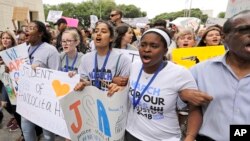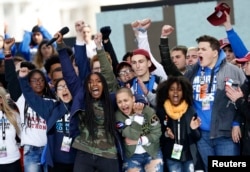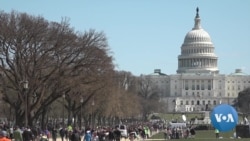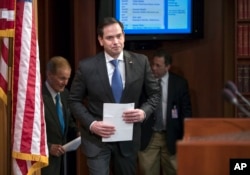While mass shootings in the United States became more controversial when 20 first-graders were gunned down in Newtown, Connecticut, in 2012, it was last year’s mass shooting at a Florida high school that has altered the conversation over gun safety and gun rights.
In the year since a shooter with an AR-15 killed 17 people at Marjory Stoneman Douglas High school in Parkland, Florida, young voters have mobilized protests nationwide and exerted their power at the polls, showing up in record numbers to vote in the 2018 midterm elections.
Though the teenage Parkland activists who organized the March for our Lives protest — which drew about 500,000 protesters to Washington, D.C., last April — increased attention to gun control and school safety, they also focused on voter registration and encouraged young people to become politically active.
It worked. Thirty-one percent of voters ages 18 to 29 cast ballots in the 2018 midterms, a 21 percent increase from 2014, according to the Center for Information and Research on Civic Learning and Engagement at Tufts University in Massachusetts. CIRCLE partially credits the “gun control movement after the Parkland shooting” for the increase in civic participation among youth.
Gun safety is one of the top reasons millennials say they cast ballots. Gun control and Second Amendment issues were listed as the top concerns for 12 percent of likely voters in a Harvard Institute of Politics poll conducted before the midterms, falling closely behind the economy, jobs and immigration.
“From the end of 2017 through the first half of 2018, concern over gun-related issues and immigration have grown in importance for young Americans,” said John Della Volpe, the IOP’s director of polling.
“As attention on North Korea settles, young Americans will turn to the White House and Congress, demanding action on both of these issues that often disproportionately impact young people.”
According to a Quinnipiac University poll, 97 percent of Americans support universal background checks for gun buyers, the highest percentage in five years. Young voters have greater confidence in universal background checks than other voters.
When asked if they believe expanding background checks would be effective in reducing gun violence in the U.S., 72 percent of respondents 18 to 34 said yes, compared with 61 percent of people 35 to 64, and 57 percent of people older than 65.
Democrats introduced a bill weeks into taking control of the U.S. House of Representatives last month to mandate universal background checks, but the bill is unlikely to pass the Republican-controlled Senate.
Some politicians, overwhelmingly Republican, were criticized in the gun safety debate after the Parkland shooting for accepting donations from the powerful National Rifle Association. Sen. Marco Rubio, whose Florida district includes Parkland, has been criticized by its students for accepting more than $3 million in political contributions from the NRA. Rubio has said he believes the issue of mass shootings cannot be solved with gun laws alone.
A Pew study conducted in October 2018 shows “no significant differences in expressions of views on gun policy by age or gender,” but instead saw clearer divides by gun ownership and partisanship.
But a year after the shooting, which drew national and international attention, no nationwide legislation on gun safety or school safety has been passed.
In the past year since the Parkland shooting, more than 1,200 Americans 18 and younger were killed by gun violence, according to a yearlong data project between news outlets The Trace and the Miami Herald. The project employed student journalists to tell the stories of each individual killed in shootings, but did not receive national attention.
A Pew study conducted in April 2018 showed that a majority of teenagers are worried about a shooting happening at their school.
While young people have been mobilized nationwide to fight for gun reform legislation, parents and teachers in the Broward County school district that includes Marjory Stoneman Douglas, stand divided on local and Florida state laws on how to secure their schools.
The Marjory Stoneman Douglas High School Public Safety Commission released a 400-page report last month about the shooting, and recommended the expansion of a program that allows teachers and staff members to carry concealed firearms to defend students in the event of an active shooter.
The recommendation was opposed by some parents of victims, as well as teachers at Marjory Stoneman Douglas high school, who say that despite their intimate knowledge of the school and its needs, they were not consulted for the report.









